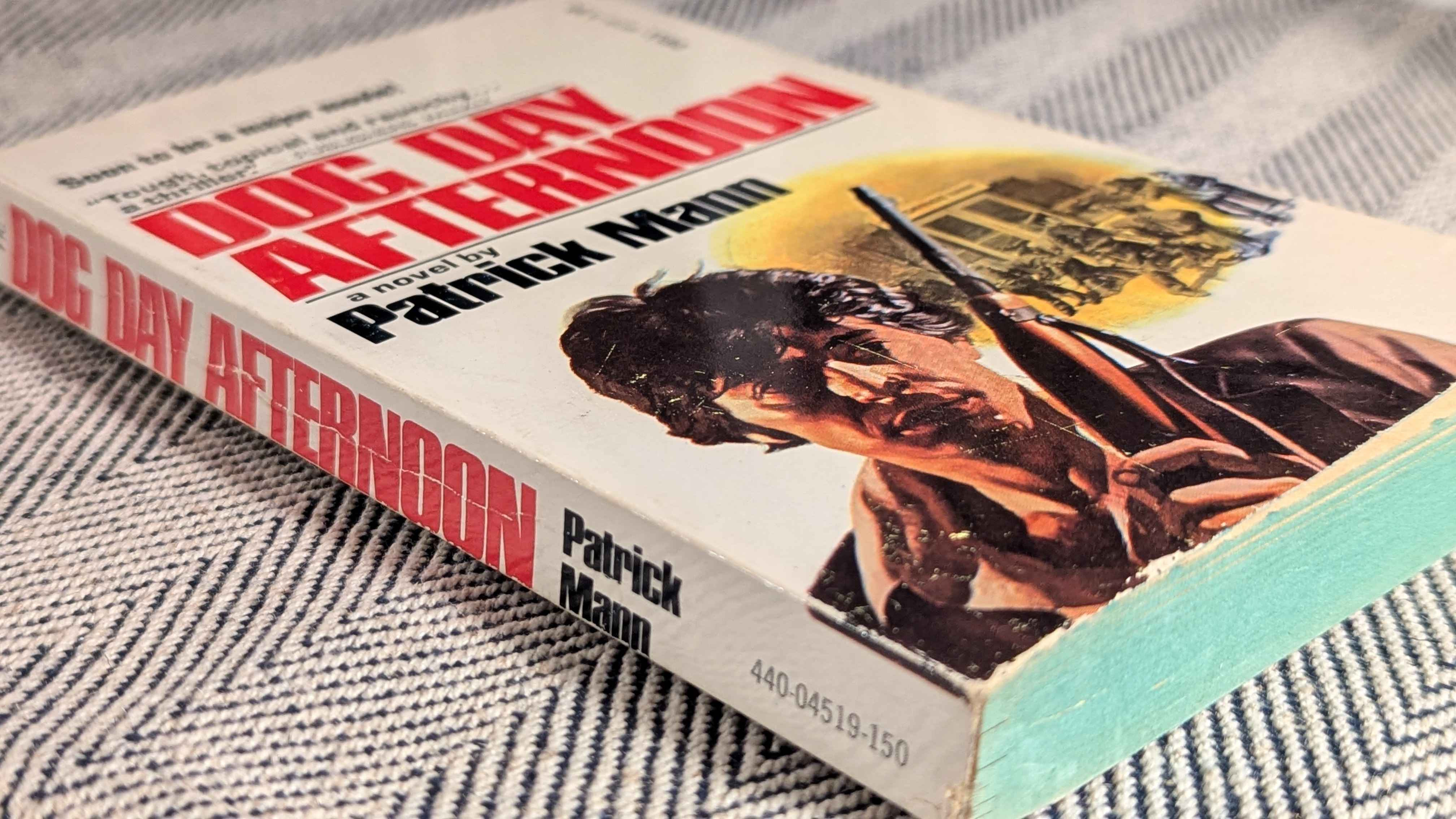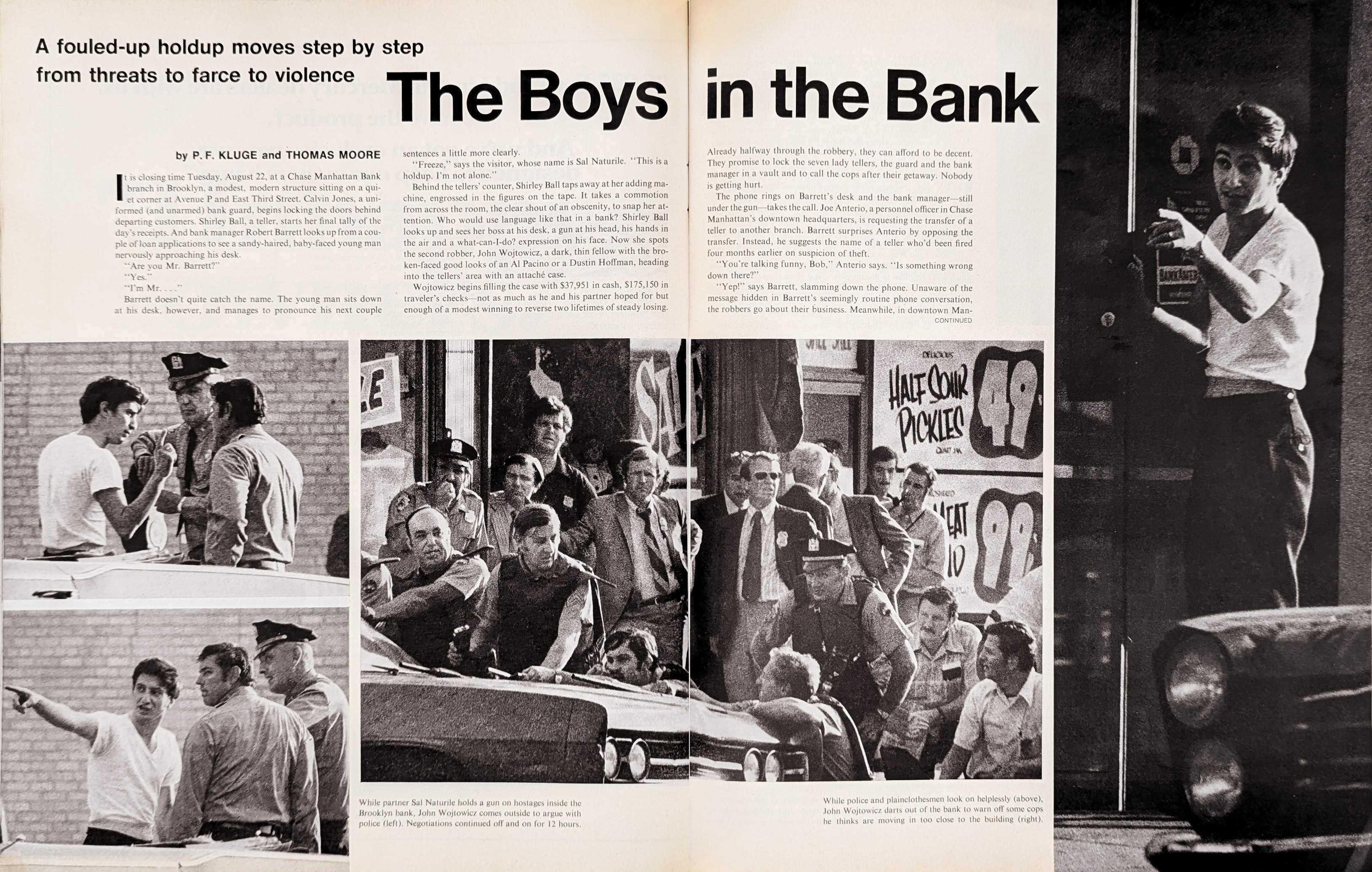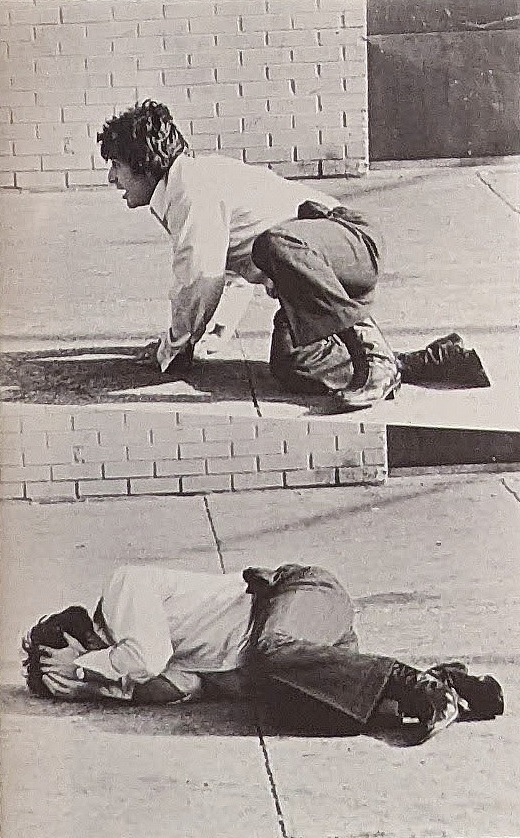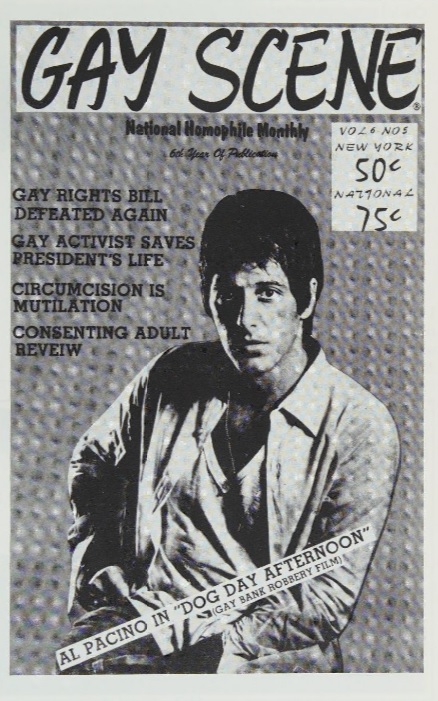"i bark. that man there, see him? he bites."
this post was originally gonna feature just the japanese theatrical pamphlet for dog day afternoon, but i actually have a couple of related things i want to share as well: the novelization of the screenplay by leslie waller, and the original article "the boys in the bank" by p.f. kluge and thomas moore, published in a 1972 issue of life magazine, which frank pierson's screenplay for the film is based on. both are easy to find online, but i just think they're neat.

dog day afternoon novelization by leslie waller (aka patrick mann)
the novel, also titled dog day afternoon, was written by leslie waller and published pseudonymously as patrick mann. the copy i have is the first dell printing from july 1975—released, apparently, before the film's US debut of september 21, 1975. film novelizations were common in the '70s so no surprise the era that produced some of my favorite films also produced some of my favorite paperbacks. i love the red title and that green edge common on dell books.
there are some major differences between the book and the movie—and, of course, the real-life robbery that inspired both. the main character in the novel is joe nowicki, or littlejoe, instead of al pacino's sonny wortzik. littlejoe is meaner, cruder, and far less sympathetic. same with sam, who is based on john cazale's character sal in the film. sam may as well be an entirely different guy. together, the two come off as cruel and obnoxious rather than the scared and desperate pair they are in the movie. there's also a bizarre amount of sexual menace (towards the female bank clerks) that does not occur in the movie and which makes both men even less like their film counterparts. i could have personally done without all that.
the novel also includes a lot more about its main characters' histories. here, littlejoe and sam are friends and well known in the local gay bar and nightclub scene, though neither of them thinks of himself as gay. some of this was true in real life. john wojtowicz (sometimes known as littlejohn basso) and salvatore naturile were friends who met at a greenwich village gay bar called danny's. the film chooses to write their relationship as more ambiguous. in one scene in the screenplay, sonny says to the bank manager, about sal, "you know, i don't know him very well—but he's not gay." this dialogue did not make it into the movie. what did make it in are two scenes where sal pleads with sonny, and then later FBI special agent sheldon (james broderick), to tell the TV stations to stop calling him a "homosexual." this is true to the actual live reporting of the heist, and the real john wojtowicz even told village voice reporter arthur bell something similar. "sal's not gay," he said. "i'm the only gay one here."

the magazine feature that inspired the film, from a september 1972 issue of life
maybe the biggest difference between the book and the movie is that the book takes almost 80 pages to get to the actual bank robbery. the movie, after some establishing shots, opens with it.
it's funny how spending more time with the novel's littlejoe, who is bitter, pompous, and misogynistic, positions him as much more villainous during the actual robbery. it ends up playing out like a more straight-faced heist novel from the era, like the dumb guy's eddie coyle. one of the things that made the real-life hostage situation and ensuing stand-off so famous was the media circus that formed around the event, due in no small part to the alleged humor and charms of the would-be robbers, who (as depicted in the film and the book) openly taunted law enforcement, courted news reporters, and sorted out personal affairs in front of a growing crowd of raucous onlookers.
"if they had been my houseguests on a saturday night, it would have been hilarious," shirley ball, one of the bank hostages, told life. "i really liked them both." (fun fact: john and sal robbed the chase manhattan in brooklyn in august 1972. swedish criminologist nils bejerot coined the term stockholm syndrome one year later, after the norrmalmstorg robbery in august 1973—an event also famously broadcast on live TV.)

stockholm syndrome or not, the film works to build both sympathy and celebrity around sonny and sal because we meet them at the same time as the hostages do. sonny is so pathetic and fails so immediately you have to feel for him, and the cops that eventually close in are framed much more antagonistically because we've spent all of our time rooted in the point-of-view of their targets. while it may shatter the illusion built by the spectacle of it all, the novel might actually do a better job capturing what the real john wojtowicz was like in his personal life. john's wife eden, whose sex-reassignment surgery john planned to fund with money from the robbery, spoke of his "bad temper," calling him "sadistic" but also "good-natured" in an interview with the village voice. bell, the author of that same report, recalled john from their overlap at gay activists alliance (GAA) events as "pleasant, spunky, a little crazy." journalist randy wicker, speaking of the man's jealous and abusive tendencies, told inside edition, "nobody could put up with john wojtowicz."
not as much is known about the real sal, who was shot and killed by an FBI agent during their trick getaway. he was only nineteen-years-old. according to the village voice, a man named gary badger, a former bartender at danny's (the same gay bar littlejohn and sal were said to have met) showed up to a GAA meeting a few days after the failed heist trying to raise funds to bury sal, who he called his "best friend." he also had a lot to say about the alleged mob involvement with the heist... which is a whole thing i'm too lazy to get into. (and i'm not a reporter, just a loser who reads too much.)
something funny about that life magazine feature is its description of john wojtowicz having "the broken-faced good looks of an al pacino or a dustin hoffman." pacino was approached with the role and proceeded to accept and reject it several times before finally settling in. hoffman was apparently interested, but not even considered.
according to producer martin bregman, "i believed that only pacino could bring the sensitivity and vulnerability we needed here." i think he was right! (i was also amused by this quote from bregman, from the same book, which i'll link below: "it took a tremendous amount of courage because he was a leading man [...] and he's being asked to play someone who is gay. it was a big risk. when you play a character you become the character, especially when you're al, and that might have been a world he did not want to explore." he sure did some exploring just a few years later in william friedkin's adaptation of gerald walker's cruising—which i'll probably make a post about someday.)

"GAY BANK ROBBERY FILM" thats so true gay scene magazine
i think i've written too many words about this now. before i go here's an issue of gay scene that i need to track down a copy of. until i do, i've posted scans from the japanese theatrical pamphlet of dog day afternoon as well as the front and back covers of the novelization. i've also uploaded my own scans for the life magazine feature "the boys in the bank" even though it's pretty easy to find it floating around online.
bonus: a stupid but funny scene early in the novel has littlejoe getting mad at his first wife tina and going to see the french connection in theaters, but only up until his favorite part, where popeye "blasted the rat on the steps of the el station and shot the big cop."
references
- bell, arthur. "littlejohn & the mob: saga of a heist." the village voice, vol. xvii, no. 35, 31 august, 1972.
- bono, sal. "the story of the doomed bank robbery that inspired dog day afternoon." inside edition, 18 april, 2022.
- kluge, p.f., and thomas moore. "the boys in the bank." life, vol. 73, no. 12, 22 september, 1972.
- yule, andrew. al pacino: a life on the wire. 1991.